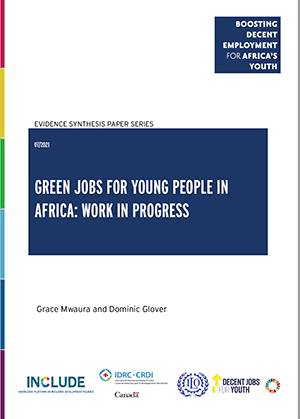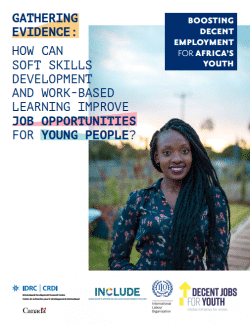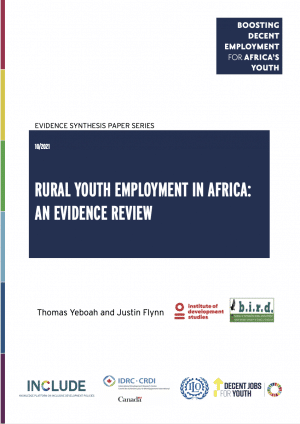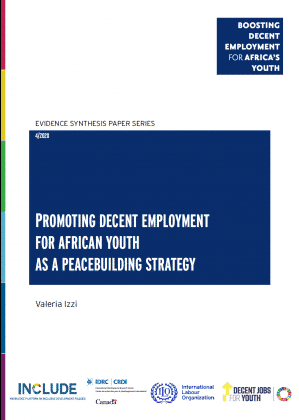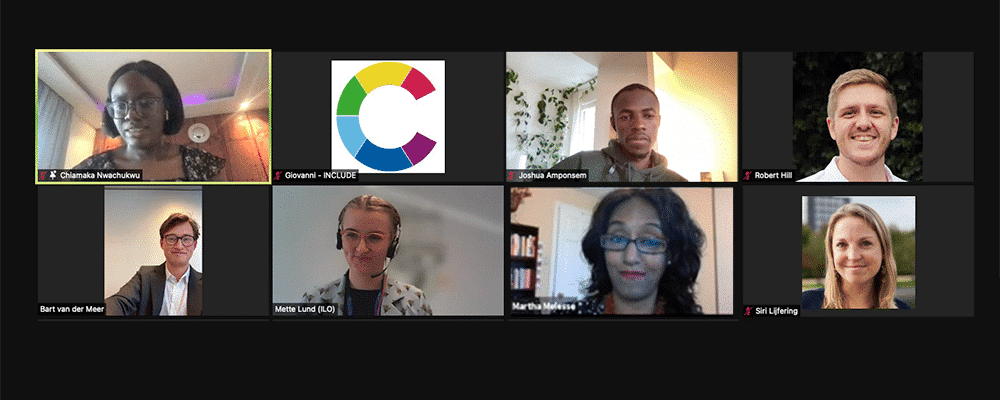
This week INCLUDE, with the support of Canada’s International Development Research Centre (IDRC) and the International Labour Organization (ILO), launched the webinar series Youth@Work. We kicked off the series with the first session on Youth@Work in the Green Economy. Researchers, practitioners and policy makers came together to exchange their views on the road towards a green economy transition and the employment potential this could offer to youth in Africa. This article presents the key insights that emerged from the online event.
Martha Melesse, senior program officer with IDRC’s Globalization, Growth, and Poverty program, opened the session with some striking statistics: 70% of the African population is below the age of 30, making Africa the youngest continent on earth and it is estimated that by 2040 Africa will have the largest youth work force in the world, surpassing both China and India. Addressing issues of youth employment, will therefore be key in shaping the future of the continent. This is according to Melesse especially important in light of the COVID-19 recovery, to address the economic fallout and socioeconomic challenges caused by the pandemic.
The green economy as a way forward
It is against this backdrop that the concept of the ‘green economy’ emerges as a potential solution to the multiplex challenges of climate change, poverty alleviation and inequality reduction, while also enabling African countries to create decent jobs and achieve an inclusive economic transformation. The ‘greening’ of economies is a process where resources are reallocated from unsustainable production systems to sustainable and regenerative ones that also reduce vulnerabilities and promote human well-being. This transformation is anticipated to create new ‘green jobs’, and for this reason is widely heralded as a solution to the youth employment crisis in Africa. As such, the main question on everyone’s mind during this first webinar was: How can the green economy provide sustainable jobs for youth in Africa?
With the UN Climate Change Conference of the Parties (COP26) in Glasgow just around the corner this discussion could not be more timely, Melesse reminded us; “We need to make sure that youth employment is on the agenda and that youth voices are heard”.
Taking a youth perspective?
Dominic Glover, Fellow of the Institute of Development Studies at the University of Sussex and co-author of the evidence synthesis paper on youth employment and the Green Economy, agreed with Melesse that youth should be at the centre of inclusive development policies. However, when it comes to facilitating a green economic transition, he stated that it is important to also consider to what extent certain issues are specifically related to youth and which are more general challenges. “There is often a lot of emphasis on issues related to youth as if the problem is with young people, while actually the problem is with the economy.” And although youth are unique in some aspects, Glover states, they are not in others. When it comes to facilitating the transition to a Green Economy you have to ask yourself: if a young person is facing challenges in finding a job, is that because they are ‘youth’ or is it because of something else, such as failing regulations, a remoteness from financial services or issues related to poverty or gender? Consequently, according to Glover, in order to stimulate the transition to a green economy for sustainable jobs, we need to consider interventions that address structural obstacles, functional problems and cross-cutting issues, not just those that target youth specifically.
To facilitate this a number of important steps need to be taken, which include the development of theories of change to inform the design, implementation and impact evaluation of green jobs and youth jobs strategies and interventions and promoting policy coherence to underpin green growth, by integrating youth employment and green jobs priorities into broader national economic development plans (the full list of recommendations can be found in the evidence synthesis paper). Another important element is to create a better evidence base on green jobs and youth employment in the green economic sector to find out what does and does not work.
Industries without smokestacks: lessons from South Africa
One of the most recent research endeavours into this topic is the study conducted by the Development Policy Research Unit (DPRU) in South Africa that wanted to find out if industries without smokestacks can provide job opportunities for youth in Africa. Lead researcher, Robert Hill, who is a junior research analyst at the DPRU and an assistant lecturer in the School of Economics at the University of Cape Town, presented evidence from his research into this question in South Africa.
As Hill shared, the unemployment rate in South Africa is extremely high and with 59% the youth employment rate is nearly double the aggregate unemployment rate in the country. The Covid pandemic has exacerbated this even further with a total job loss of 114 million jobs in Africa according to the ILO. To mitigate these challenges, new jobs need to be created and industries without smokestacks (IWOSS) could be the answer. These industries, which include tourism, horticulture, agro-processing and transit trade, can offer viable alternatives to manufacturing when it comes to large scale job creation and are as such a promising avenue to explore further. It also has the potential to immediately absorb a large share of youth as there doesn’t seem to be a shortage of youth at any skills levels required for IWOSS.
However, important to note, and an aspect that was also pointed out during the discussion in the webinar, is that industries without smokestacks are not necessarily green jobs. Tourism, for example, can pose significant environmental challenges and the financial sector might invest in industries with smokestacks, thereby creating negative environmental impact. Therefore, when moving to a green economy, Hill acknowledged, we need a concerted effort to make these industries green and prioritise green IWOSS jobs above other, non-sustainable ones.
Skilling, reskilling and upskilling
This point was elaborated upon by Mette Grangaard Lund who works as a Technical Officer at the Green Jobs Unit at the ILO. In her presentation, Lund stressed the need for a holistic approach when it comes to the Green Economy and think about how we can both take important steps in ‘greening’ existing businesses that are not typically green, and create jobs that are ‘green at the core’.
This will be especially important in Africa according to Lund, since many African countries are still highly dependent on natural resources, which makes their economies extremely vulnerable to climate change. As such, climate action or climate inaction is closely linked to the employment prospects of youth in Africa. Transitioning to a green economy is therefore essential when it comes to investing in youth employment. However, as Lund recognises, a green transformation of the economy will also destroy and displace existing jobs, even as it creates new ones. A point that is also brought forward by the authors of the ESP on the Green Economy. This is bound to be disruptive, even if the eventual outcomes are generally positive. Therefore, according to Lund a strong emphasis needs to be placed on ensuring that it is a ‘just transition’, promoting decent work and ensuring social protection where needed, so that no one is left behind.
A key aspect of a just transition is investing in skills development, which includes the upskilling and reskilling of youth to bridge the skills gap they might have when it comes to meeting the demand of the new green economy. Secondly, a just transition also needs to focus on the demand side of the job market; creating new jobs that are sustainable and inclusive. An important aspect of this, according to Lund, is to stimulate enterprise development and entrepreneurship skills to encourage youth to set up new green and social businesses.
Social enterprises as the engine of growth
Bart van der Meer, who represented the Sustainable Economic Development Department (DDE) of the Dutch Ministry of Foreign Affairs at the webinar, agreed wholeheartedly with Lund that enterprise development should be at the core of a youth employment policy strategy, stating that “Micro, small and medium-sized enterprises are the main engine of growth, economic development and employment and we should strengthen these and the environment they are operating in.” To illustrate this point, Van der Meer shared the example of a business that the Ministry of Foreign Affairs has funded through its innovation fund, which is Searious business, a social enterprise that aims to reduce the amount of single-use plastic discarded into nature in Morocco. Searious Business works together with Moroccan supermarket chains and informal workers who collect waste to collect plastic bottles in supermarkets and as such reduce plastic leakage into the environment. According to Van der Meer, this example shows how investing in innovations in the green economy can be an important accelerator for youth employment in Africa.
The final speaker at the webinar was Joshua Amponsem, an environmental and climate activist who focuses on the role of youth in climate change adaptation, disaster risk reduction, and resilience building. Amponsem agrees with Van der Meer and Lund that MSME’s have high potential when it comes to creating jobs for youth: “Local social enterprises are where the enthusiasm is and the potential for growth; they understand the context and know what is needed. We need to invest in these businesses to leverage this potential.” An important aspect, according to Amponsem is to work with informal workers in the transition to a green economy. The informal sector makes up the lion’s share of the labour market in many African countries, but are often not reached by development interventions because they are not well organised. In order to really facilitate a sustainable transition, development agencies should, according to Amponsem “not see the informal sector as a beneficiary of an intervention, but need to work with informal workers as close allies”.
Adding to this and drawing the discussion to a conclusion, Chiamaka Nwachukwu, moderator of the webinar and ex-Programme Coordinator of the Youth Charter at the African Union Office, highlighted the need to ensure that a transition to a green economy is a just transition and that we make sure that green jobs are also decent, and pay particular attention to the most vulnerable segments of society such as women and people with disabilities, only then can we truly harness the potential of the Green Economy for youth employment in Africa.
